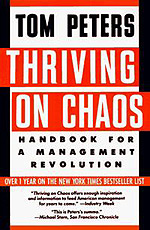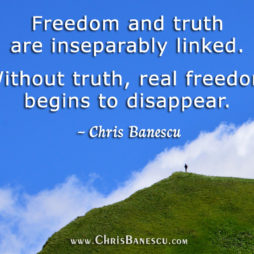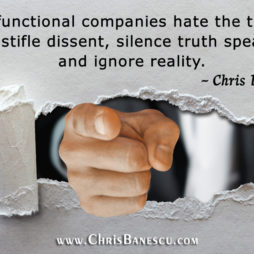 Telling the truth is too often overlooked in business. Truth is the catalyst that should inform all management decisions and actions. It’s the foundation on which trust and integrity rest. Truth is the critical prerequisite that enables management and employees to make ethical decisions in the day-to-day activities of an organization.
Telling the truth is too often overlooked in business. Truth is the catalyst that should inform all management decisions and actions. It’s the foundation on which trust and integrity rest. Truth is the critical prerequisite that enables management and employees to make ethical decisions in the day-to-day activities of an organization.
Now when I speak of “truth” I mean the objective reality of our lives that we can all categorically agree with. This includes facts and information that cannot be disputed and are universally true whether or not someone chooses to acknowledge them. Some examples include: two plus two always equals four, water is necessary to sustain life, man has landed on the moon, companies must be profitable to remain in business, in a vacuum light travels at precisely 186,282.397 miles per second, and only 0.037% of our atmosphere is made up of carbon dioxide.
Truth does not include subjective opinions about situations and information that reasonable people can disagree with. For example, people can argue about how much personal freedom and individual rights we have in our democracy; the ocean can be described as being blue, blue-green, light-blue, or dark-blue in color; whether 80 MPH or 120 MPH is too fast to drive a car; how much exercise is needed to stay reasonably fit; and whether a Riesling or a Chardonnay wine should be served with fish.
Live in Reality
Living in reality and dealing truthfully with yourself and those you come in contact with in an organization is a must. Subjective opinions with little basis in fact have no place in business and corrode the overall climate of an enterprise, undermine the integrity and authority of its leadership, and diminish the trust of its employees, customers, and partners.
There are several important areas where truth must play a part in helping managers effectively lead and manage organizations.
Nothing destroys organizational cohesiveness and employee morale faster than egotistical managers with a flawed view of their own abilities, power, and status.
Managers and executives must possess the strength of character and the necessary moral clarity to see themselves as they really are and be truthful in their own self-assessment. This requires them to have a brutally honest understanding of their actual strengths and weaknesses as leaders, a willingness to admit personal flaws and mistakes, and a determination to make the necessary changes for the better for the benefit of the long-term success of the business and in nurturing and promoting trust and integrity across the organization. Nothing destroys organizational cohesiveness and employee morale faster than egotistical managers with a flawed view of their own abilities, power, and status.
Executives must be truthful when communicating with the company owners or shareholders on the status of the business and other key organizational and strategic issues that impact the short-term profitability and long-term value of the business. Management owes a fiduciary responsibility to the business owners. They are entrusted with the task of ethically and efficiently managing and caring for the business and all its assets, including its most valuable — the employees, as if those money and assets were their own.
Their yes should mean yes, and their no should mean no.
Management must be truthful in all dealings with employees. Their yes should mean yes, and their no should mean no. Superiors must be honest when communicating with employees, and also in motivating, admonishing, rewarding, promoting, or firing them. If management promises raises and bonuses for meeting and exceeding goals, then give them. If management asks for feedback, they should follow through on the suggestions received, otherwise don’t bother asking. If the company has hit hard times and everyone must make sacrifices, then management must warn employees and be the first in line to make a proportional sacrifice. If layoffs are planned, then let the people know ahead of time.
Truth and Ethics
Truth is also indispensable in supporting ethical and strategic short-term and long-term decision-making at all levels of an organization. Executives must see reality as it really is. If they have no comprehensive knowledge and understanding of what is going on with their employees, company processes, financial condition, products or services, market share, competition, and fiscal and political environments, then management cannot reach the right conclusions and take the correct actions in managing. They also cannot effectively deal with day-to-day operations and insure the long-term profitability, growth, and success of the company.
Executives must see reality as it really is.
Finally, management must deal honestly with their customers. This ought to include all sales, advertising, and marketing activities, be reflected in the quality and features of the products and services provided, and be a guiding principle in all customer service related actions. The promised features and benefits of the products or services sold should always be true. The warranties given should be fair and ethical, without countless exceptions and clauses that render them useless. Customer service departments must deal expediently and honestly with valid customer complaints and deliver on the assurances they give.

Tom Peters, the famed management guru, in his book Thriving on Chaos, expressed that companies should “demand total integrity.” He maintained that successful organizations have to shift from “an age dominated by contracts and litigiousness to an age of handshakes and trust.” Peters’ advice reinforces the critical nature of truth in organizations: “Set absurdly high standards for integrity – and then live them, with no fuzzy margins.”
Some may say that such lofty goals are good in theory but impossible to achieve in practice. Maybe that’s true, but that just shows how far we have strayed from the ideal. If truth is no longer the measuring stick of decisions and actions, then things are worse than we think. Is it any wonder that so many people don’t trust companies and executives anymore?
Listen to Podcast
If the player doesn’t load, download the podcast.



